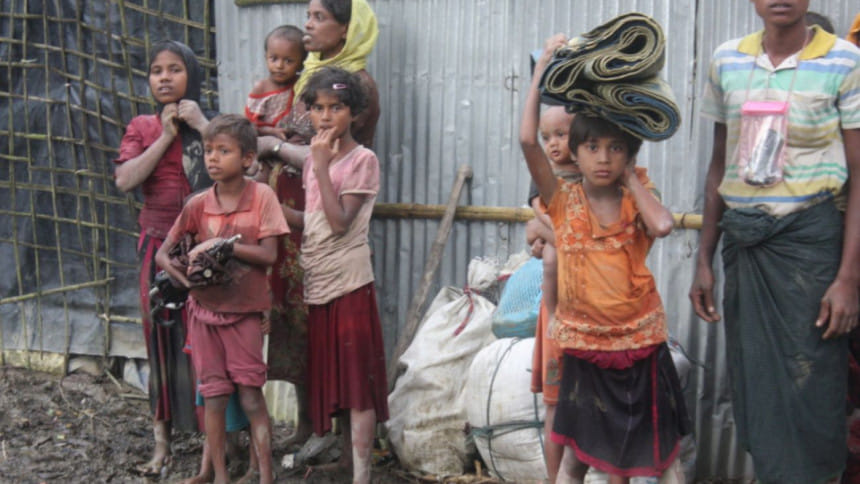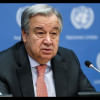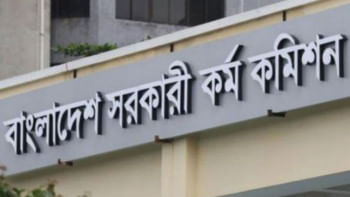Is there any end to the plight of Rohingyas?

Bangladesh can feel that she is not alone in combating the stupendous pressure brought on her by an unprecedented Rohingya influx into her territory. The immediate outpourings of sympathy and expressions of humanitarian concerns for the victims, messages of solidarity and support to Bangladesh and condemnations of the Myanmar regime can be seen from two angles: First, these are indicative of a certain arousal of international conscience; and secondly, the outburst is at an initial stage, to be developed into a package of actions ensuring the return of Rohingyas to the Rakhine State.
It won't be easy, but is attainable provided we pass a few reality checks in order to be pragmatic and reasonably fail-safe. The pivot around which we need to rebuild our case is that as per the 2014 census in Myanmar, the Rohingya Muslim population stood at 2.4 million. If that figure is not credible, a fresh count may be made in a normalised environment in due course. The point I wish to highlight is this: In spite of the waves of exodus into our territory, amounting to a large number, a substantial number of Rohingyas do remain in the Rakhine State or thereabouts on the unassailable grounds of continuous residency. So it will be a worthwhile, in fact a morally obligatory mission, to protect them from atrocities as we work to secure repatriation of the refugees encamped in Bangladesh.
The three other factors we have to bear in mind as we embark on a decisively remedial approach are: One, the humanitarian concerns, however eloquently expressed for the weak and vulnerable, have scarcely, if ever, overridden geopolitical considerations including trade and investment priorities of the big powers. We have a considerable potential geo-political clout ourselves; we only need to play our cards to work our way on to the right side of the equations.
Secondly, an ethnic minority with an Islamic identity is liable to be suspected of militant inclination, especially when a step-motherly treatment has been meted out to them by a government.
Thirdly, and importantly, Aung San Suu Kyi, as the foreign minister and state counselor of her country is not in the driving seat. She cannot apparently overrule the military which is in charge of ethnic minorities. Besides, the army maintains control over the heartland by extracting from the largesse of mineral wealth of Myanmar and sharing it with the powerful countries.
On a side note, earlier this year, U Ko Ni, a prominent Muslim personality and legal advisor to Daw Suu was shot and killed at Yangon airport. He was purportedly working on an amendment to the 2006 constitution that would have clipped some of the powers of the military.
We expected that India being the nearest and professedly most friendly neighbour to Bangladesh would be sensitive to our present plight—a huge Rohingya refugee influx even as we reel from the effects of a devastating flood. Well, that expectation seems to have been belied.
The Times of India in a report on September 6, 2017 gave the highlights of the Modi-Suu Kyi meeting in Yangon in the following, rather one-sided terms:
a) "India shares Myanmar's concern over the violence in the Rakhine state."
b) "Suu Kyi thanked India for taking a strong stand on the terror threat that Myanmar faced recently."
In his 35-minute address to the Indian Diaspora, Prime Minister Modi "did not allude to the Rohingya Muslim crisis," even though Myanmar is facing international censure and its repercussions spill over to India in the shape of "illegal immigrants".
The Times of India noted that Modi's observations came at a time when Bangladesh was facing refugees pouring across the border two weeks after Myanmar's military crackdown in the Rakhine State. The Hindustan Times also reported that Modi was silent on the Rohingya issue.
We think, the Indian prime minister has lost an opportunity to play an honest broker here. Given the prestige India enjoys with the Myanmar establishment—Suu Kyi saying "Myanmar looked up to India for (guidance) and support"—and Bangladesh's close ties with India, a process of engagement could be initiated by Modi.
China has remained equally silent over the imperilled Rohingyas. She has an important vision of a corridor girdling Myanmar and Sri Lanka. But having regard to her traditional clout with Myanmar topped up by infrastructural investments and a sliver of ethnic connectivity, China can persuade Myanmar to see reason to make up with Dhaka. Doesn't Bangladesh have a claim to it as a friend of China?
In these days of distracting global issues with newer complexities amid "post-modern confusions" it is difficult to stick by any line of distinction between friend and foe. In such a context it's imperative for Bangladesh to craft her own policy package and implement it with selective but effective international assistance.
The components of such a policy can be various forms of diplomatic pressure on Myanmar if it continues to be defiant of the Human Rights Charter of the UN; reinstatement of citizenship rights that were divested of them in 1982. Interestingly, cards were given to them to participate in the 1990 election and they won some parliamentary seats as well. While annulling the results of the 1990 election, the military didn't only throw the winner Suu Kyi in jail but also dubbed the cards the Rohingyas used as "fake".
The immediate task is two-fold: Take the refugees under the wings to provide emergency medical attention, food and shelter. Secondly, we must take up repatriation of the refugees with the Myanmar government, spearheaded by the UNHCR. Their orderly return to their homeland and resettlement will have to be ensured under the UN auspices, if necessary, buttressed by an appropriate UN resolution.
Shah Husain Imam is a commentator on current affairs and former Associate Editor, The Daily Star.
Email: [email protected]










Comments